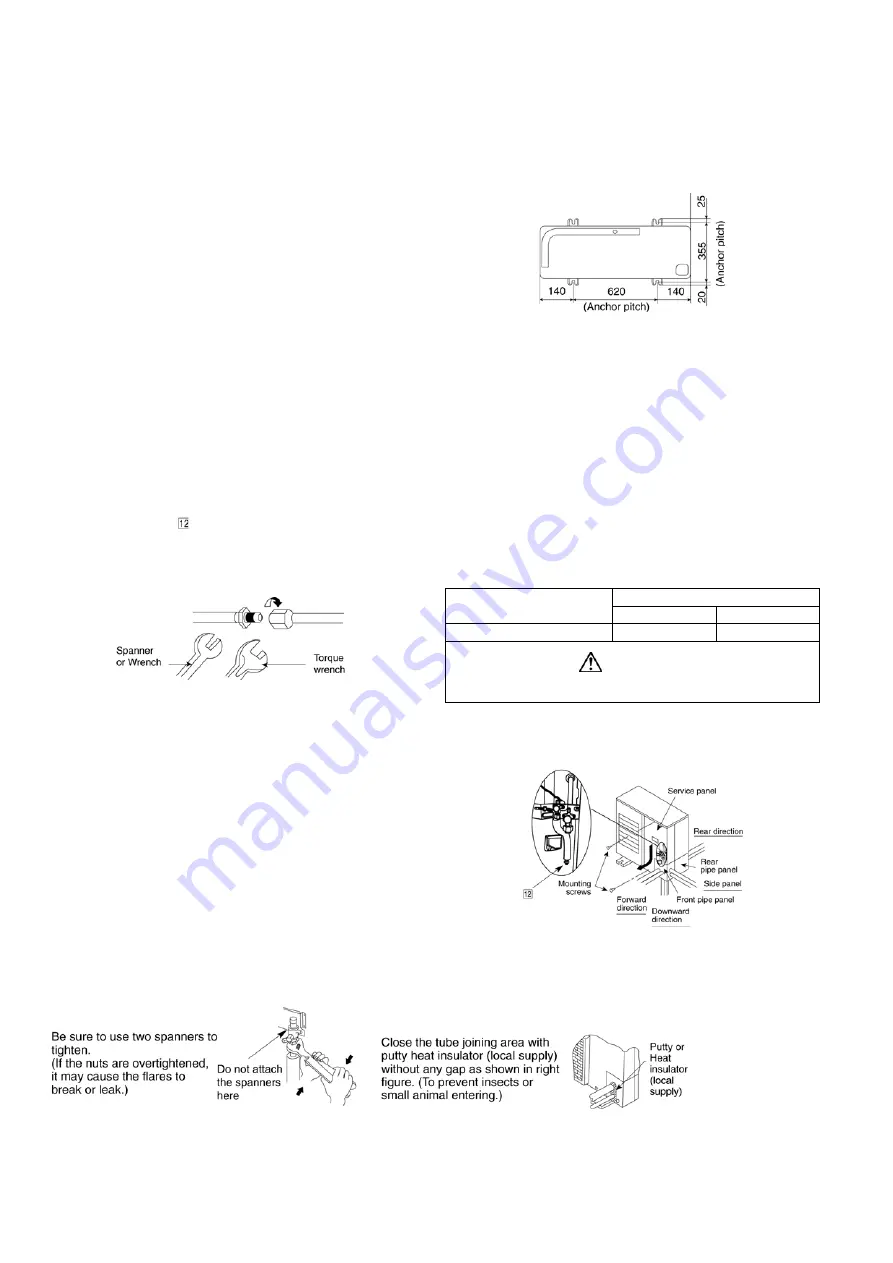
24
11.4. Outdoor Unit
11.4.1.
Install The Outdoor Unit
• After selecting the best location, start installation according
to Indoor/Outdoor Unit Installation Diagram.
1. If installing the unit to a concrete base or other solid base,
use M10 or W3/8 bolts and nuts to secure the unit, and
ensure that the unit is fully upright and level.
(The anchor bolt positions are shown in the diagram at
the right side.)
In particular, install the unit at a distance from the
neighbouring building which conforms to regulations
specified by local noise emission regulation standards.
2. Do not install the outdoor unit to the building’s roof.
3. If there is a possibility that vibration may be transmitted to
the rooms of the building, place rubber insulation
between the unit and the installation surface.
11.4.2.
Connecting The Piping
11.4.2.1. Connecting The Piping To Indoor Unit
Please make flare after inserting flare nut (locate at joint portion of tube assembly) onto the copper pipe (in case of using long
piping).
Connect the piping
• Connect tube ass’y as shown in the picture.
• Align the center of piping and sufficiently tighten the flare nut with fingers.
• Further tighten the flare nut with torque wrench in specified torque as stated in the table.
11.4.2.2. Connecting The Piping To Outdoor Unit
Decide piping length and then cut by using pipe cutter. Remove
burrs from cut edge. Make flare after inserting the flare nut
(locate at valve) onto the copper pipe.
Align center of piping to valves and then tighten with torque
wrench to the specified torque as stated in the table.
Local pipes can project in any of four directions.
• Make holes in the pipe panels for the pipes to pass through.
• Be sure to install the pipe panels to prevent rain from getting
inside the outdoor unit.
[Removing the service panel].
(1) Remove the two mounting screws.
(2) Slide the service panel downward to release the pawls.
After this, pull the service panel toward you to remove it.
Model
Piping size (Torque)
Gas
Liquid
PC36HKV
3/4” [100 N
l
m]
3/8” [42 N
l
m)
CAUTION
Do not over tighten, over tightening cause gas leakage.
Summary of Contents for CS-PC36HKV
Page 9: ...9 5 Dimensions 5 1 Indoor Unit Remote Control 5 1 1 CS PC36HKV...
Page 10: ...10 5 2 Outdoor Unit 5 2 1 CU PC36HKV...
Page 11: ...11 6 Refrigeration Cycle Diagram...
Page 12: ...12 7 Block Diagram...
Page 13: ...13 8 Wiring Connection Diagram...
Page 14: ...14 9 Electronic Circuit Diagram 9 1 CS PC36HKV...
Page 15: ...15 9 2 CU PC36HKV...
Page 16: ...16 10 Printed Circuit Board 10 1 Indoor Unit...
Page 17: ...17 10 2 Outdoor Unit...
Page 18: ...18 10 3 Indicator...
Page 22: ...22 This can be used for left rear piping and left bottom piping also...
Page 45: ...45 17 Technical Data 17 1 Thermostat Characteristics Cooling Soft Dry...
Page 46: ...46 17 2 Operation Characteristics 17 2 1 CS PC36HKV CU PC36HKV...
Page 47: ...47...
Page 50: ...50 18 2 Outdoor Unit 18 2 1 CU PC36HKV...
Page 51: ...51...
















































